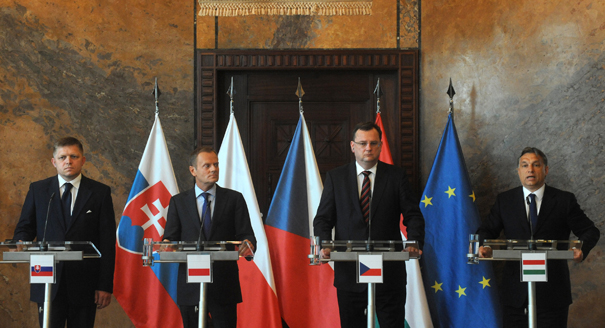When was the last time you heard an interesting Czech idea on how to revive European economies? Or a memorable Hungarian proposal on how to reform the EU? Of the Central European countries, only Poland has tried in earnest to initiate a debate on how to combat the economic crisis (by proposing, during its EU presidency, to deepen the single market in services). But the rest of the “Visegrád” governments, the three above plus Slovakia, have mostly stayed quiet or have turned inwards since the crisis began. Yet, they need to spell out how they want economic growth in the EU to resume, for a number of reasons.
First, by leaving the initiative to other EU member states, the Central European governments breed a sense of powerlessness at home which, in turn, encourages euroscepticism. Too few Central Europeans feel that the EU is their creation, too. They see Germany, France, and other large countries shaping its agenda and suspect that the interests of Central Europe are being given a short shrift. Unless the governments in the region demonstrate that they have influence over the EU's future, more of their citizens will turn against “Brussels” and seek refuge in populist ideas.
Second, the four Visegrád countries (V4) are part of the shrinking group of EU states that strongly believe that open, liberal economies and competition bring prosperity. Too many other governments seek false comfort in protectionism which would prolong the crisis and possibly jeopardize the EU's single market. This is not to say that the Visegrad countries are of one mind: Hungary, for example, is more protectionist than its neighbors. But the similarities among the V4 outweigh the differences. They have export-led economies whose success depends on EU borders remaining open to the flow of capital and goods. They abhor the push by some member-states for too much harmonization in areas such as taxation. And the V4 believe that countries which have lost their competitiveness should reform as the Central Europeans have done in the 1990s and 2000s. These are sensible ideas that, if adopted by the rest of the EU, would help alleviate the effects of the crisis.
Third, by staying mum on subjects such as the EU's future or economic growth, the Visegrád governments miss an opportunity to keep the United Kingdom engaged in the EU. Eurosceptics there have successfully propagated the idea that the EU is set on harming Britain's economic interests. The Central Europeans can help blunt this argument. There are remarkable similarities between theirs and the British’s views on how to reform the EU economies. Together, they stand a better chance of turning these ideas into EU policy which would in turn help the UK government counter the eurosceptics' charge.
And fourth, by contributing so little to solving the EU's current problems, the Central Europeans reinforce the stereotype of new member-states as “single issue” countries concerned with maintaining the flow of EU aid and little else. This erodes their ability to advance other useful ideas dear to the V4, such as EU enlargement to the Western Balkans or the need for the EU to adopt a more robust energy policy.
Central European economists, ideally together with their UK colleagues, should start spelling out a new approach to reviving European economies, centered on deepening the common market in areas such as services and the digital economy. Much of the analytical work has been done already; the 2010 UK Treasury paper on the benefits of expanding the common market is a great starting point. The new initiative can start as an academic exercise, perhaps as an expert paper produced by key Central European and UK think tanks.
If it is well written and argued, the V4 governments should give serious consideration to converting it into a non-paper for other EU member states, with input and support from the UK government. By doing so, the Central Europeans could burnish their credentials as a source of innovative economic thinking, and give their public a reason to claim ownership of the EU. And if the London government, with their help, can demonstrate that other EU countries listen to its ideas, it will have deprived the eurosceptics in the UK of some of their arguments.
No single initiative will arrest the tide of euroscepticism in Britain. But the Central Europeans can and should help the UK stay in the EU. If Britain leaves, the Central Europeans will lose a powerful ally in keeping the EU market-oriented and outward-looking.
Tomas Valasek is head of the Central European Policy Institute in Bratislava.






.jpg)